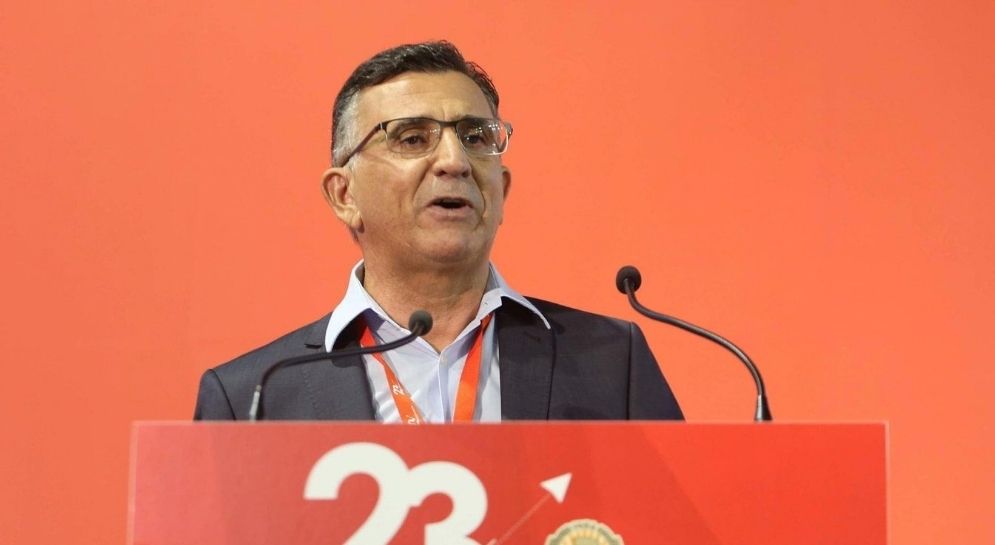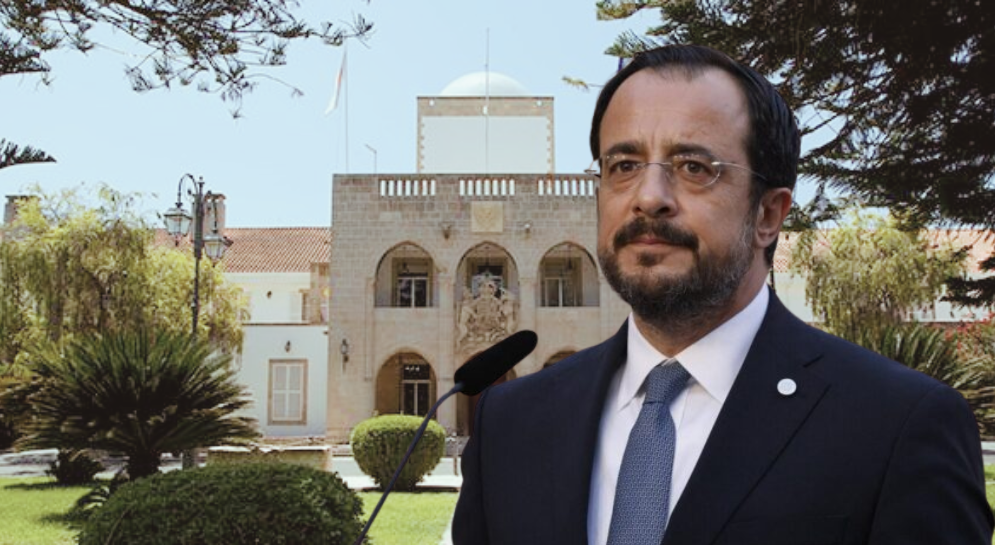
”CHINA DAILY” interview with Nikos Ioannou, member of the Secretariat and Political Bureau of the Central Committee of AKEL, July 2022
QUESTION 1: The 20th National Congress of the Communist Party of China will be held later this year, how do you assess the importance of this meeting? In light of your previous visits to China, what do you think are the major achievements of China in the last ten years?
NI: The 20th National Congress of the Communist Party of China (CPC) will be of unquestionable, historical and strategic importance for the future course of the Chinese people and the country.
It takes place at a pivotal point. The CPC has 100 years of life and struggles. It remains by its very nature radical and progressive. As when a group of young people were creating the 4th May Movement of 1922 to shake off the occupation of the country. The CPC has recorded almost 75 years of presence in the leadership of the state and the people of the country since the 1948 Revolution. Its greatest achievement is that it has managed to transform China from an underdeveloped almost feudal country into a modern and developed economic and social state.
One of the most important and momentous decisions of the 22nd Party Congress will be the country’s transition to a new qualitative stage of development. It will determine the long-term strategic path for building a modern socialist society with Chinese characteristics.
China’s achievements over the past 10 years permit it to move with confidence from the stage of a moderately prosperous society to the building of a modern socialist society. In the last 10 years the Peoples Republic of China (PRC) has managed:
First: To combat and eliminate poverty from the country.
Second: To lead the world as the country with the highest trade growth.
Third: To be today only a breath behind the USA in global economic growth. All the indications are that it will achieve this feat too.
Fourth: To raise the standard of living of the Chinese people significantly. Living standards include per capita income, which is an important measure of living standards, but not the only one. The well-being of the Chinese people is registering a continuous and gradual rise in the improvement of living conditions such as the sufficiency of consumer goods and the provision of quality services in health, education and housing. Protecting the environment and preserving the rich cultural tradition are among China’s priorities under Xi Jinping’s leadership.
QUESTION 2: Have you met President Xi Jinping and what is your impression of him? In your opinion, which of his qualities has played an important role in leading the Chinese nation and people to continuous achievements?
NI: I have attended a Congress CPC in Dialogue with World Political Parties High Level Meeting in November 2017. There, I had the opportunity to meet in the same hall and listen to the speech of comrade Xi Jinping. I hope for a more personal contact in the future.
I believe that Xi Jinping’s charismatic personality and authority have played an important role in China’s development and progress over the past 10 years. China’s successes are undeniable, as reflected both in the numbers registering growth and the improvement in the people’s living standards.
I have been visiting China almost continuously since 2012 except for the pandemic period. The growth is evident every time I visit the country. One can see this with one’s own eyes and I say this without exaggeration.
The most important contribution of the leader of the Communist Party and the country is that he has been able to inspire the Party and the Government, but especially the Chinese people themselves, the ordinary people of the country and this is his greatest contribution. To inspire and guide his people. I believe the CPC is right to discuss and recommend extending his term of office. This cannot be seen as a personal cult towards Xi Jinping but rather a dialectical analysis of the facts and the Chinese comrades have the same knowledge. His presence at the helm can lift the country even higher.
QUESTION 3: Cyprus and China established diplomatic relations 51 years ago. As an old friend of the Chinese people, you have witnessed and participated in the development of friendly relations between us. How do you evaluate the current relationship between our countries and the current state of cooperation in various fields such as politics, economy and culture?
Ni: Cyprus in size and area for Chinese standards is like a small Chinese city. But this has not been an obstacle for the PRC to maintain economic, diplomatic, commercial, trade and social relations with the Republic of Cyprus. The respect shown to a small country like Cyprus proves how “big” a country the PRC is. This is a great honor for it.
For us Cypriots, the PRC is a good and true friend. We are grateful to this friendly country for the principled stance it has always maintained for the solution of the Cyprus problem. Cyprus has been a semi-occupied country since 1974 and has been fighting for liberation and reunification. The support of the PRV towards our struggle is invaluable.
The economic and trade relations between Cyprus and China are at a very good level and can become even better in the future. We have almost 50 years of diplomatic relations. These relations in recent years have expanded significantly at all levels. It is very important, for example, to see dozens of children from Cyprus studying in the friendly country free of charge with a scholarship from the PRC.
The support your country offered to Cyprus was very important, especially during the first period of the pandemic. Trade relations between Cyprus and China have improved in recent years. There is a 23% increase in exports to China in 2021 during a pandemic period. This is very encouraging. In Cyprus, the large gas terminal project to transport natural gas to Cyprus will start construction soon. The project is being built by an international consortium with the participation of the Chinese Petroleum Pipeline Company. It is one of the largest investments on the island. The investment in the casino is also big by Cypriot standards, as other large investments with the participation of Chinese capital are also under study.
Cyprus exports more agricultural products to China such as juices, wines, halloumi (Cypriot cheese), while efforts are being made to export other products such as potatoes, meat, honey, fish, etc. In November Cyprus will have a good presence at the International Agricultural Products Exhibition to be held in Shanghai.
QUESTION 4: Have you visited the projects built by Chinese companies in Cyprus and how do you evaluate their role for your country and people? How do you see the cooperation between our two countries in the framework of mechanisms such as “One Belt, One Road”, and EU-China cooperation?
NI: I am in contact with Chinese investors and other citizens visiting Cyprus, whether they are here on the island or visiting Cyprus. Our cooperation with China benefits both countries. China is proving to be a good trading partner and many European and other countries are admittedly seeking trade cooperation. It is projected that $22 trillion worth of goods will be imported by China over the next 10 years. Europe will benefit enormously from cooperation with China. Before the pandemic, around 10 million Chinese travelled to Europe annually for holidays.
Globalisation in Marxist terms is an ongoing process and only benefits countries. The attempt by NATO and the USA to put artificial obstacles in the way of the globalisation of markets does not work in favour of mutual cooperation and of addressing humanity’s problems. The one road one belt policy has already begun to bear fruit and has been accepted by many African, Asian and Latin American countries. The benefits of China’s opening up to the outside world through the one road one belt mechanism are mutual. This policy is also based on reducing distances by building state-of-the-art steam, land and air infrastructure and fleets that significantly reduce distances. Europe, and the European Union in particular, will benefit significantly if it succeeds in further expanding its economic relations with the PRC. NATO and US involvement to the east of Europe, instead of leading to stability and security, has brought serious problems to the peoples of Europe.
QUESTION 5: Have you read “Xi Jinping: The Governance of China” or other writings of President Xi Jinping and what do you think about the works? What is your assessment of President Xi Jinping’s governance concept, such as “people-centered” and “full and strict governance over the Party”?
Ni: Yes, his book was a very good opportunity to learn more about China and also to compare with what I actually saw when I was in the country. As I said before Xi has been able to inspire ordinary people and the Chinese people and guide the Party correctly. For a leader to succeed in putting the people at the centre, he must first be trusted by the people themselves. I have the impression that both have been done. What is it that determines whether a developmental model is successful or not? The most important criterion is the well-being of the people. The leader of the country can only be judged in a positive light (except for those who make judgements to serve expediencies). When a people do not suffer from poverty, when the increase in per capita income is continuous in recent years, when the standard of living is on the rise, then yes, it means that conditions are improving and the people are living better.
In his book, I am struck by the fact that there is no attempt to sweep the country’s problems under the carpet. Instead by acknowledging them, he can subsequently solve them. He follows the same tactics as his predecessors by first acknowledging in them the contribution of each of them individually to China’s development, which is not generally seen among heads of state. Any criticism is constructive and necessary in order to draw the right conclusions about the course the country has taken since the 1948 Revolution.
Lenin once said that “the party is the mind, honor and conscience of our time”. For the Party to play its pioneering role in society it needs to be disciplined and dedicated to the cause of building socialism. Phenomena such as entanglement/interwoven interests, corruption and violation of its operating principles will inevitably lead the country to distorted development and society to decline and parasitism. Therefore, comrade Xi is right in his book to refer to “full and strict governance over the Party”.
QUESTION 6: President Xi Jinping has recently proposed Global Development and Global Security Initiatives, offering Chinese solutions to the world’s development and security problems today. How do you see the exemplary role of Cyprus and China in practicing multilateralism and strengthening the international system with the United Nations as its core?
NI: There is no doubt that, contrary to what we were hoping, as we are traversing the 3rd decade of the 21st century, many peoples all over the world are on a daily basis faced by interventions, aggressions, threats and confrontations. This in addition to the enormous global challenges caused mainly as a result of human activity: climate change, poverty, hunger, now further exacerbated by the energy, supply chain and food crises.
I cannot but fully agree with President Xi’s statement that development is a timeless theme for humanity and only through continuous development can the people’s dream for a better life and social stability be realised. And development demands solidarity with those countries that require it, equality in sharing our planet’s resources, while respecting the needs of generations to come.
Both these important Initiatives encapsulate previous initiatives and proposals put forward by the PR of China in recent years, stressing that the challenges and confrontations can only be confronted and overcome through cooperation, based on mutual respect and understanding – through multilateralism. Unilateralism and the claim for world domination, including by military means and not excluding the use of nuclear weapons, is bringing the world to the brink of destruction. The recent NATO Madrid Summit Declaration only adds to our concerns and worries for the future.
There is a way of coming out of the current situation: fully respect International Law, stay committed to respecting sovereignty and territorial integrity of states, uphold non-interference in internal affairs and respect independent choices of development paths and social systems made by the people in each country. In other words abide by the principles of the UN Charter. Double standards and the law of the mighty have no place.
As I have already mentioned, Cyprus and my party AKEL are grateful for the PR China’s consistent and principled position in the framework of the UN Security Council in connection to the efforts to reunify Cyprus under a bizonal bicommunal Federation with political equality as defined by the UN. The solution of the Cyprus problem will be significant in encouraging cooperation and solution of the many and complicated problems faced by the peoples in the Eastern Mediterranean and Middle East. Hence, in conclusion, I would say that by insisting on multilateralism and strengthening the UN as the core of the international system both the PR China and Cyprus are bringing a positive contribution in the effort to achieve peace and development for all peoples
Question 7: Last year was the 100th anniversary of the founding of the Communist Party of China, and you participated in “CPC in Dialogue with World Political Parties High-Level Meeting” on behalf of AKEL. How do you evaluate the current cooperation between the two parties? AKEL is also approaching 100 years since its establishment. In your opinion, what experience is worth summarizing and exchanging between the two sides, and what aspects should we strengthen cooperation in the future?
The sizes of the two Parties are not comparable. The Communist Party of China has been in power for over seven decades and has 89 million members, and AKEL operates under capitalism and has 12 thousand members. And yet the two parties have much in common and share common ideological principles and rules of functioning. Rules of functioning such as democratic centralism, accountability of bodies, control, criticism and self-criticism and even the structure are characteristics of parties that adopt the ideology of Marxism. The CPC puts into practice the basic principle of the Marxist-Leninist theory of solidarity and proletarian internationalism.
Each Party applies Marxism dialectically in its own specific conditions. Marxism is not like the Christian gospel to be applied dogmatically. We have maintained for many years a comradely relationship and close contact with the CPC. We keep each other informed of developments, exchange views on ideological and political issues, and generally agree on many issues. We are informed about the course of building socialism with Chinese characteristics and are often asked by our Chinese comrades to express our views.
In recent years, within the framework of exchanges with the CPC, many AKEL cadres and rank-and-file members have visited China. They are given the opportunity to get to know the people, the culture, the customs and traditions and of course the development of the country. They return with the best impressions.
Both parties bring with them 100 years of life and struggle. I believe that the relations between the two parties will be strengthened in the process and will become even stronger.




